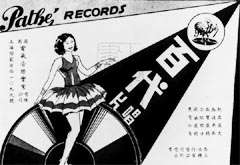Pathé Records (China)

- "China Record Company" redirects here. See also China Record Corporation.
Pathé Records (Chinese: 百代唱片; pinyin: Bǎidài Chàngpiān; Cantonese Yale: Baakdoih Cheungpín) is the first major record company in Shanghai, China and later Hong Kong. The company was a subsidiary of the Pathé Records conglomerate.
History
Around the beginning of the 20th century, a young Frenchman named Labansat set up an outdoor stall on Tibet Road in Shanghai and played gramophone records to Chinese citizens who were curious. The phonograph was purchased from Moutrie and Company, and he charged anyone 10 cents to listen to a novelty record called "Laughing Foreigners" (洋人大笑).[1] Anyone capable of resisting any laughs or chuckles got their money back. Phonographs were becoming popular in the city in 1906.[2] By 1908, he received help from a French engineer and an assistant from Ningbo and established "Pathé Orient" (東方百代),[1] also known as "Pathé Asia," though other sources point to the renaming in 1921.[2]
The company initially recorded Peking Opera. Mandarin popular songs became hits, and they were sold at stores like Wing On in Shanghai.[1]
In 1930 Pathé's factory was taken over by Columbia Records in Shanghai and was used to press odeon and beka with the manufacturing portion named "China Record Co. Ltd," and the distributor continued as Pathé Orient.[3] In the same decade, Pathé went under British EMI, who were originally seeking to make a profit on the Bund selling gramophone records.[2] Ren Guang became Pathé-EMI’s new director and began getting involved with leftist music devoted to the proletarian cause. The leftist music was eventually cut off by the Japanese military officials in 1937, who also forced the company to fire Ren.[1] Any Japanese plants were also taken back to the Nipponophone Company(日本蓄音器株式会社).[2]
From the late 1930s to 1940s the company held the rights to 90% of the mandopop songs.[4]
In 1950 Pathé stopped releasing records in China and was taken over by the Chinese Communist government. Two years later the Pathé office in Hong Kong started to cut records, thus returning the glory of Shanghainese pop music in the British colony. Pathé Hong Kong faced fierce competition in the 1960s with the rise of Diamond Records and eventually ceased Shanghainese pop production and cut Cantopop instead, which gained popularity in the early 1970s.
Pathé Hong Kong has since changed its English name to EMI Hong Kong but has retained its original Chinese name to this day.
See also
References
- 1 2 3 4 Jones. Andrew F. [2001] (2001). Yellow Music - CL: Media Culture and Colonial Modernity in the Chinese Jazz Age. Duke University Press. ISBN 0-8223-2694-9
- 1 2 3 4 Xinhuanet. "Xinhuanet." Baak Doi and the Old Records. Retrieved on 2007-04-21.
- ↑ Vernon, Paul. Haupl, Benno. [1995] (1995). Ethnic and Vernacular Music, 1898-1960: A Resource and Guide to Recordings. Greenwood Press. ISBN 0-313-29553-0
- ↑ Shoesmith, Brian. Rossiter, Ned. [2004] (2004). Refashioning Pop Music in Asia: Cosmopolitan flows, political tempos and aesthetic Industries. Routeledge Publishing. ISBN 0-7007-1401-4